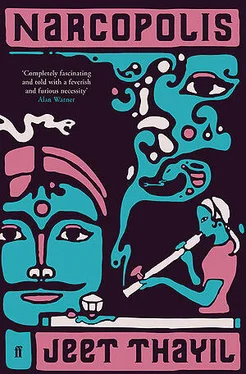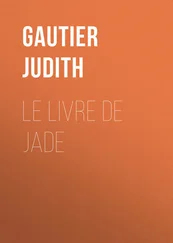‘Tell me. One minute,’ and Rashid said a few words to Bengali, something about getting the cookpot started for the day’s second batch of chandu, which was an unnecessary order: Bengali had never forgotten to do it.
‘Okay.’
‘I’ve been approached by Sam Biryani. You’ve heard of him, he’s always in the papers.’
‘He’s too much in the papers.’
‘He made an offer, very good terms to open a garad pipeline from Tardeo to Nagpada.’
‘If it’s a good offer, take it up.’
‘That’s why I’m here. I’ve brought this up with you before but you never give me a proper reply. My suggestion is we do it together. Garad is the future of the business.’
‘Your topi is fur, isn’t it? Doesn’t it get warm in this weather?’
‘It’s insulation, bhai, in winter and summer, that’s why we Kashmiris wear them.’
‘That’s why you Kashmiris are so hot-headed. Take it off once in a while, miya, it might lighten your outlook. Meanwhile, listen to me: I won’t sell powder here.’
‘You use it but you won’t sell it.’
‘I use it carefully.’
‘Everybody says that. What about the Pathan, Kader Khan? I’m trying to remember how soon he was finished. Six months? Or less? Such a dada and look at him now, khatarnak junkie.’
‘This is what you want to talk about? Give me a lecture about the evils of drugs?’
‘You’re an educated man. You have your way of seeing things.’
‘You mean I’m not seeing something.’
‘I mean you should be thinking of diversifying, expanding your business.’
‘Garad separates the strong from the weak; it brings out the worst in a man and the best. That’s why the Pathan gave up so quickly; inside he was nothing.’
‘And you?’
*
Rashid was looking at the street. A beggar woman squatted over a puddle by the garbage pit on the intersection of Shuklaji Street and Arab Gully. She was dark and plump and she wore a fitted kameez that she held up around her waist. Emptying . The correct word for what she was doing. He noticed that her hair had been very stylishly cut, cropped short over the ears, with pointed sideburns and a little tail in the back. The puddle under her expanded and the people on the street stepped over it without comment. Then the woman’s head came up and her eyes met Rashid’s and there was no embarrassment in her face, only intelligence. From the balcony, he could see into Khalid’s khana next door. It was a smaller room, with a single pipe and no customers, no one there at all except for the pipe maker. Rashid’s was already busy, a group of Spanish-speaking hippies around one pipe and students from Wilson College around the other. Waiting their turn were Dawood Chikna, an up-and-coming businessman and gangster, and Bachpan, a pimp, with his friend and associate, the pocket-maar Pasina. Last in line was a fellow called Spiderman for the way he crawled on all fours. Salim was there too, in a new shirt, a starched yellow number with flap pockets and large collars. He was at Dimple’s station, deep in conversation with the kaamvali. Rashid wanted to know what they were talking about but all he could hear was Khalid, who was saying that a businessman should never sample his own merchandise, particularly if his business was drugs, and that a Mussulman did not put his habits before his duty to God, that only kafirs did such a thing. Rashid watched the beggar woman who was tidying up the garbage on the sidewalk and he thought about his system. A man’s reputation depended on never seeming intoxicated. So, in the afternoons, he read Inquilab , squinting at the editorials, some article on the Muslim Brotherhood’s travails in Syria or the Jews’ latest incursions into Lebanon, and he stole a few quick nods. Then he’d give an order to Bengali, whatever order it didn’t matter, a shout for a pipe or for lunch, a summons for the malishwallah, for whisky or cocaine, an audible order to an employee to re-establish the chain of command. In the evening if he’d been drinking a lot he went upstairs for an hour or two to nap. He was always mindful of his reputation, but here was this Khalid, this Kashmiri, casting aspersions. Just then, Rashid noticed something odd. All sound and activity had frozen, as if a giant wave was about to hit the street, and this was the split second of calm before the chaos. The beggar woman was completely still, a black marble statue listening intently to the decades as they passed through her; the salt march to freedom; the years of upheaval and bloodletting and so-called Independence; the years of the Pakistan wars when headlights were painted black to keep automobiles safe from enemy jets; the years of regulation and control and planned socialism; the years of failure. Everything was frozen, even the traffic and the sunlight and the slight still breeze, and then the woman went back to her work and the street too resumed its normal pace and Rashid realized he’d been holding his breath.
*
‘What is she doing, the beggar woman, what is she doing?’ he asked Khalid.
‘It’s already a thing of the past, chandu,’ Khalid said, ‘like these pipes.’
‘Like everything, like us.’
‘That is the nasha talking, not you. Listen, very soon all the khanas will be closed, ours included. Last month, they closed six. In one month. Padlocks and chains courtesy Customs Excise.’
‘There are too many on this street. Let them close.’
‘And then? What will you do for business?’
‘This, that.’
‘You’re a BA pass, educated man, but you’re talking like you don’t know how to read-write.’
Rashid brushed the hair off his face with his hands, letting the thought take shape in his head before he spoke. He said, It’s a funny thing, only the uneducated set so much stock by education. When you go to school you realize how little it means, because the street belongs to whoever takes it. Today it’s ours; tomorrow someone else will take our place. My problem, I don’t like garad heroin. Garadulis put their foot on the accelerator and push all the way to the floor. The car was going five miles an hour and suddenly it’s up to fifty-five. Super fast, then crash. A chanduli can smoke for years and be healthy; garadulis are impatient, they want to die quickly. You say we’re businessmen and we should provide what people want. What kind of a businessman would I be if I supplied heroin to chandu customers? I would be a chooth businessman. I’d be shooting myself in the foot. Why I’m telling you this, it’s my way of saying don’t ask me again to join you in business.
Salim, Pasina and Dimple were not looking in his direction, but some of the others were. Even Bengali, unflappable as the old man was, had forgotten himself and was staring. Khalid lit a cigarette and regarded Rashid as he smoked. His shirt was tucked into pleated trousers and the Kashmiri topi was tilted at an angle on his head. He was a drug dealer but he looked like a shopkeeper.
Finally he said, ‘The crazy woman? She’s mending a salvaar, she’s stitching, that’s why she’s half dressed. She’s crazy but she keeps quiet. Your kaamvali, the hijda Dimple, why do you let her talk so much?’
‘The customers like to hear her talk.’
‘Our scripture says women must be silent in the assemblies of men. It isn’t permitted for them to speak. This is a chandu khana but it is also an assembly of men. Tell her that.’
‘Tell her yourself, there she is.’
But Khalid would not look in her direction.
‘Kaam,’ said Bengali, as if to himself, ‘is work in Hindi, but desire or lust in Sanskrit. So kaamvali has a double meaning, which this gentleman is doubtless aware of.’
*
Rashid asked for tea and Marie biscuits to be sent to the beggar woman with the haircut who was still stitching, seated on the sidewalk on the junction of Shuklaji Street and Arab Gully. She was not, at the moment, reclining on the garbage. It occurred to him that she used the garbage dump as a toilet and the sidewalk as a living area. He heard Khalid say something about tapping new sources of income and the need to expand one’s consumer base if one wished to stay on top of the business. He was talking to save face. Rashid watched a boy from the teashop downstairs hand the woman a glass of milky tea and a plate of biscuits. She sat on a metal awning from Delite Restaurant, the restaurant out of business, the awning lying on the street for months now, its tin warped. She sipped at the tea, her little finger raised in the air. She ate the biscuits one by one, daintily, dipping each one in the tea before putting it in her mouth. She was smiling.
Читать дальше












